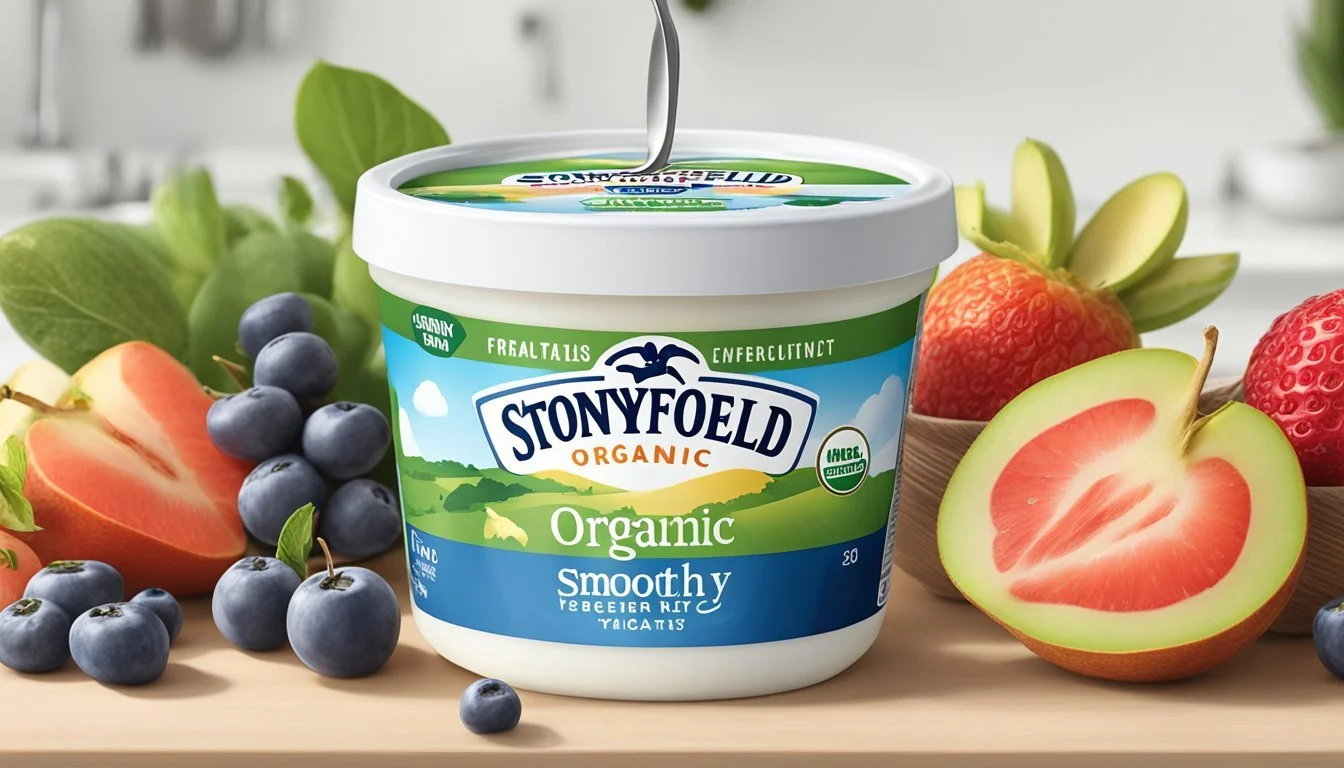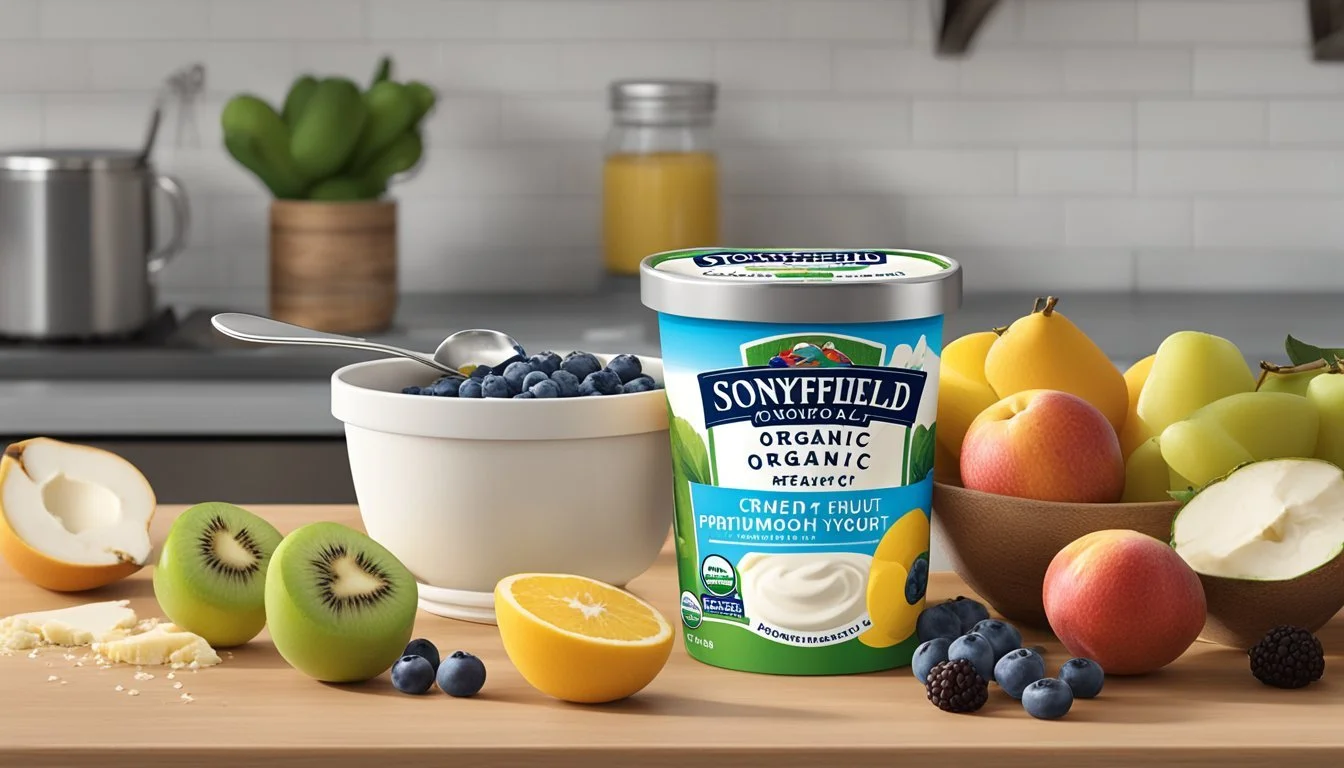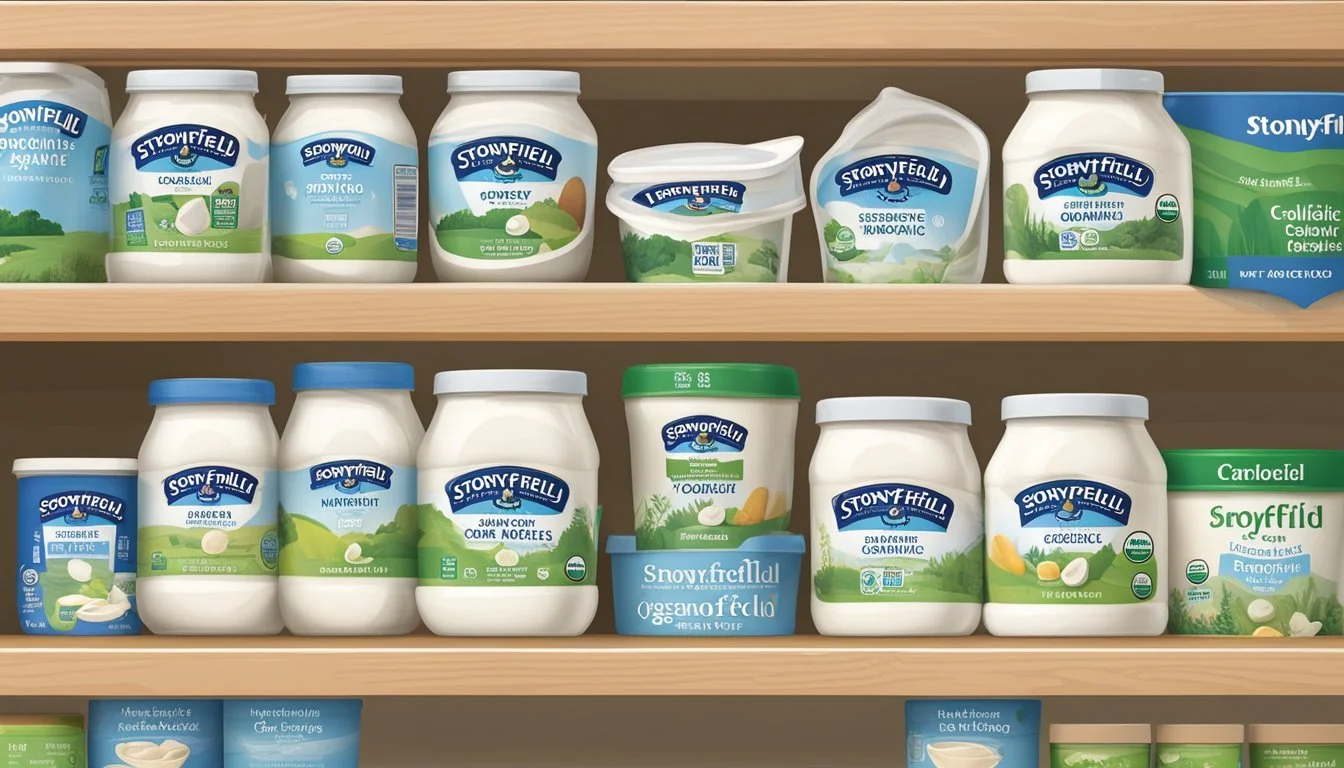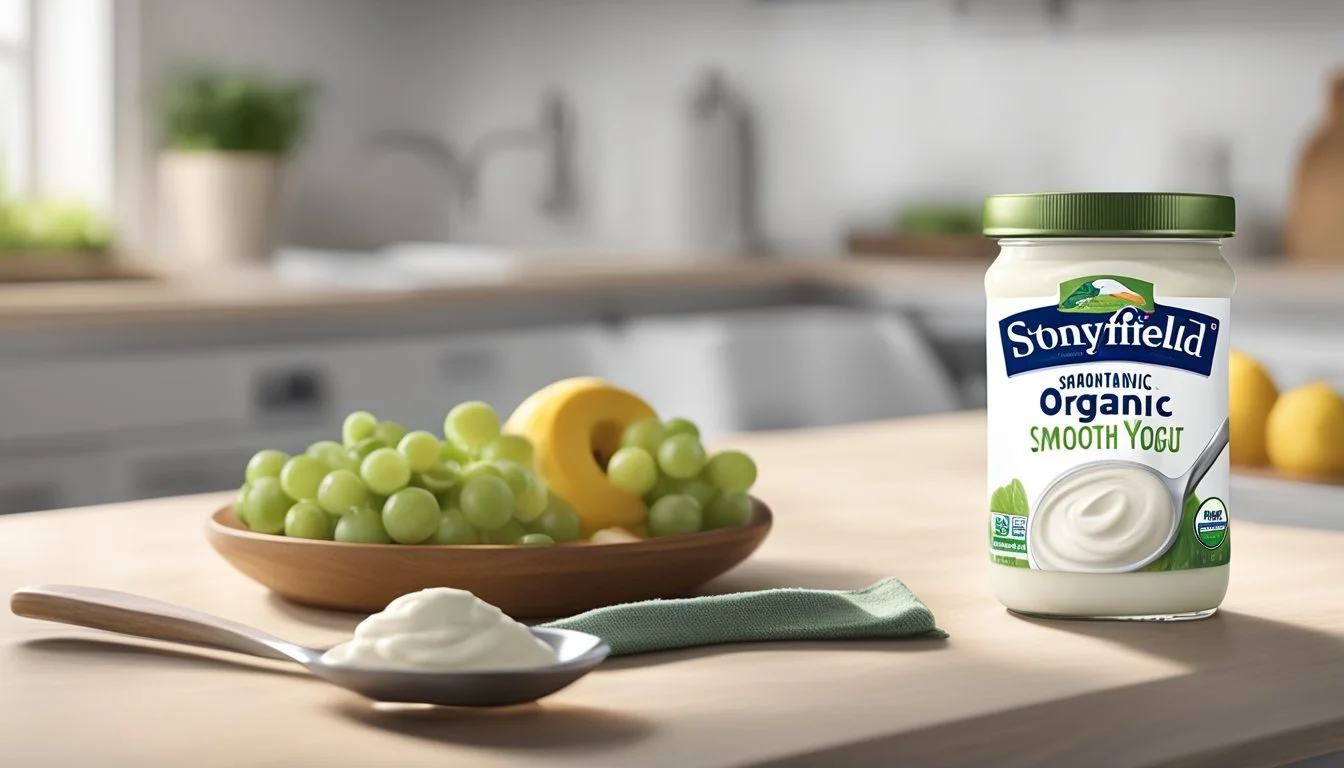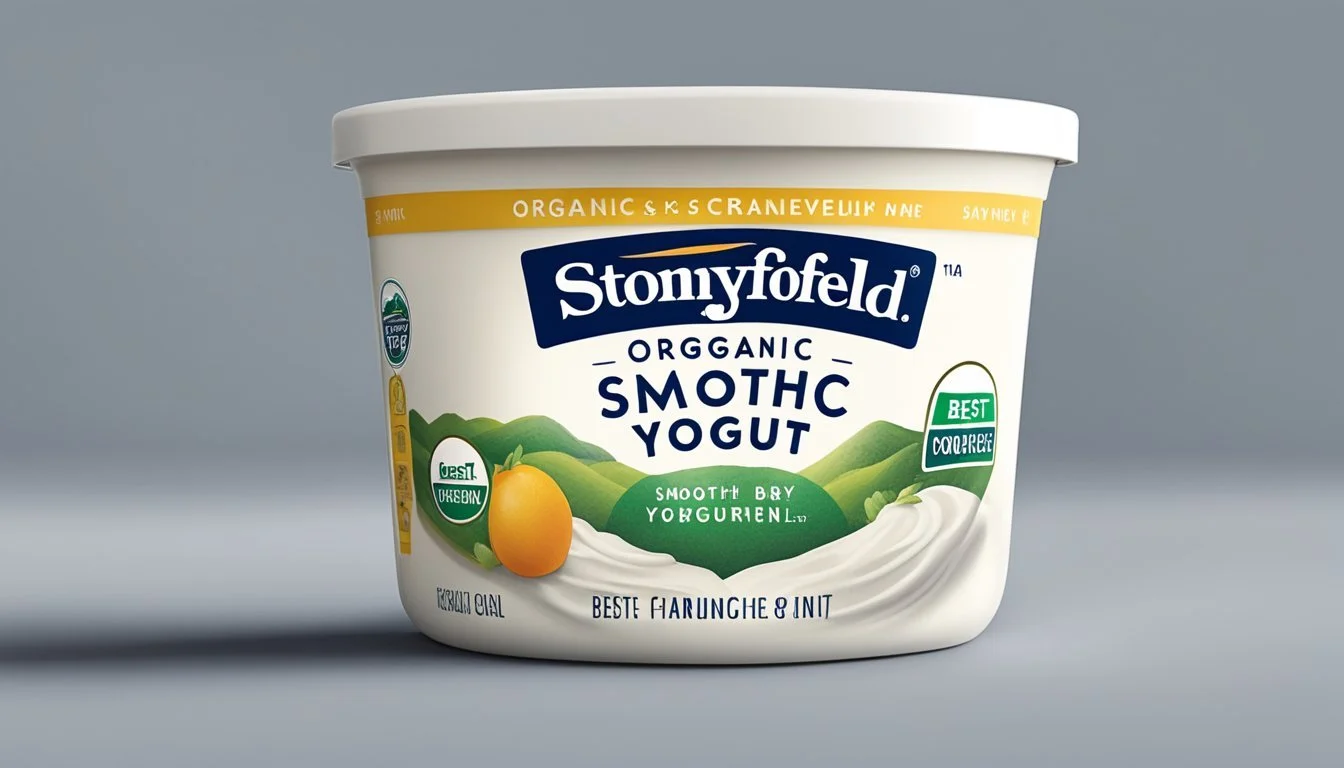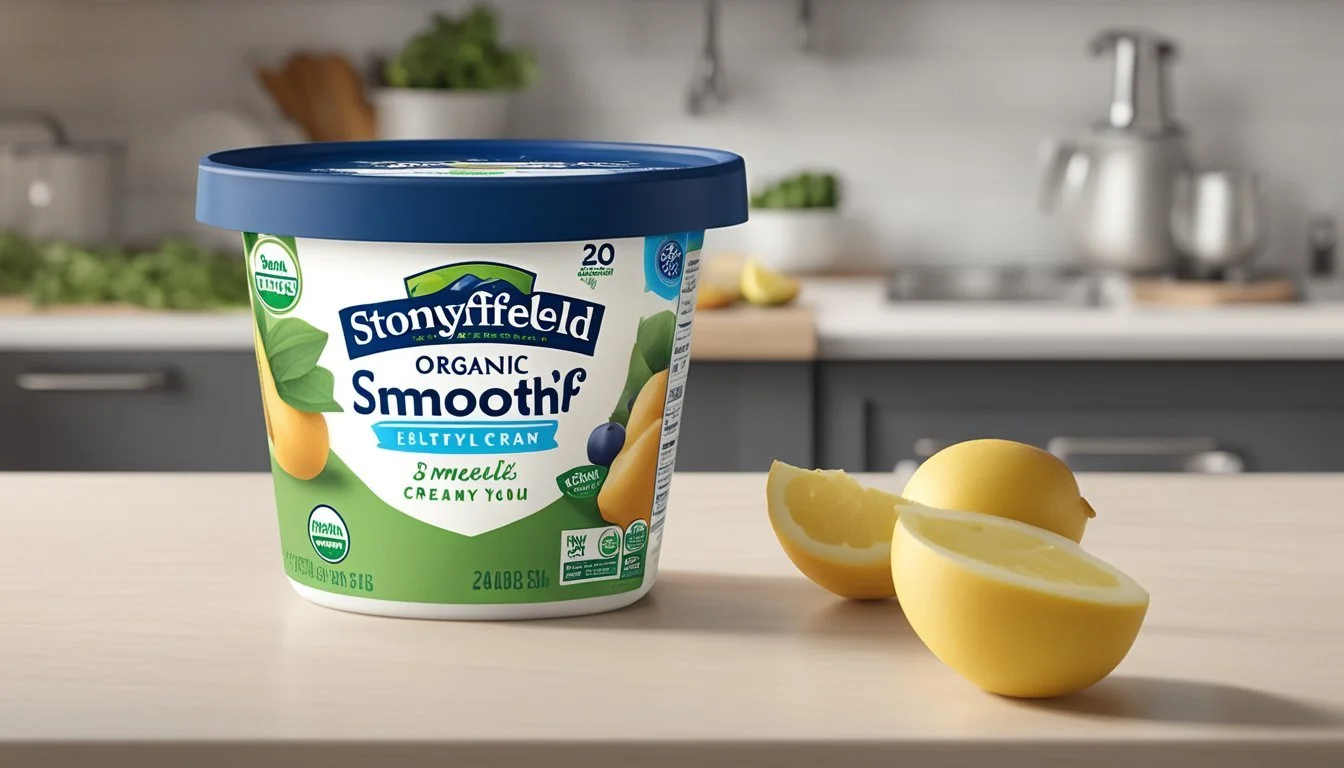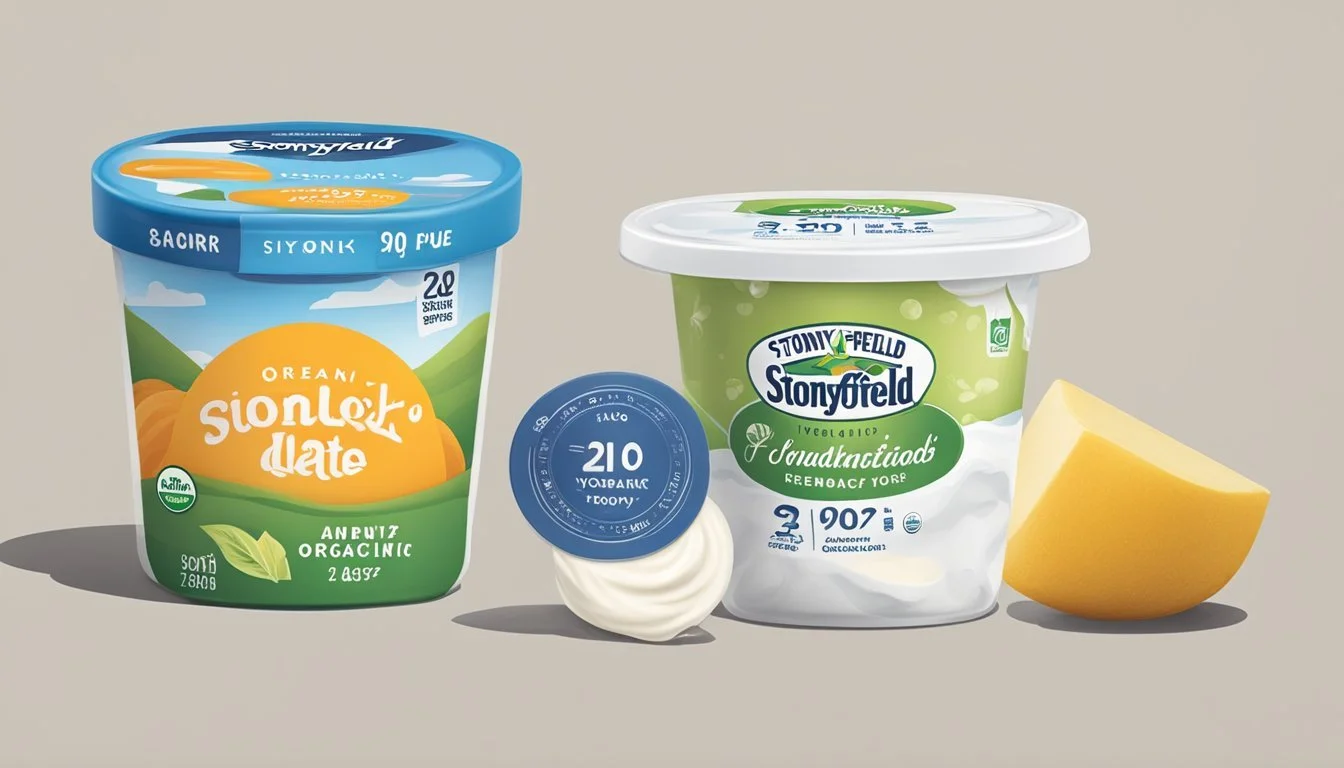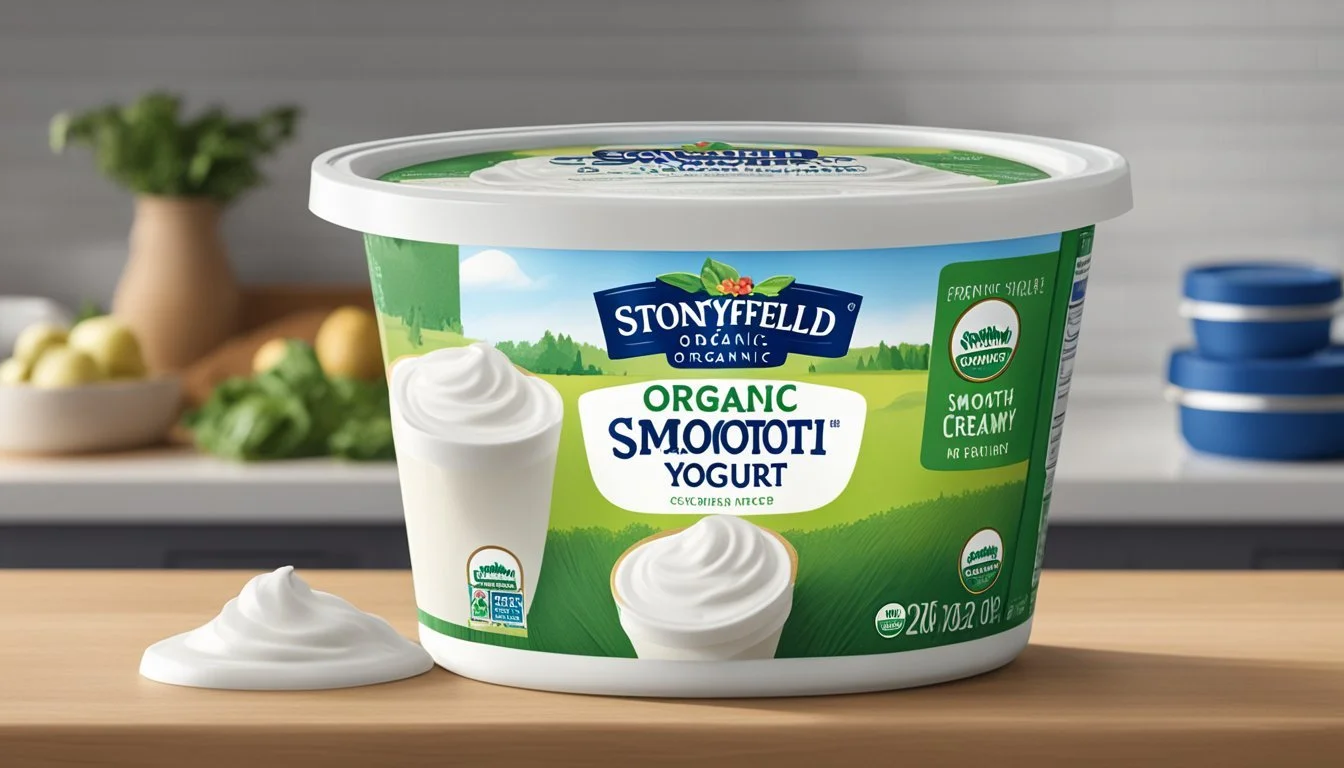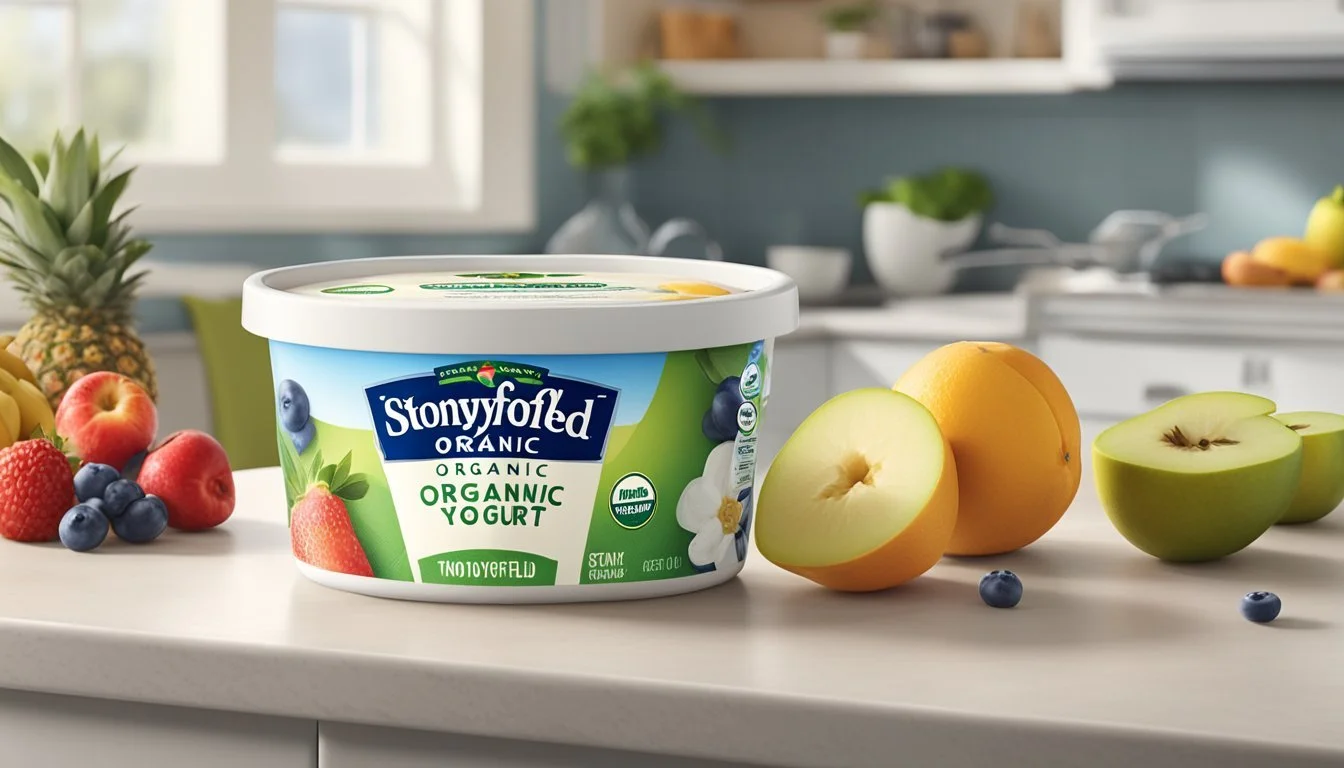How Long Does Stonyfield Organic Smooth & Creamy Yogurt Last?
Unveiling Shelf Life Facts
When it comes to dairy products, understanding their shelf life is crucial for both safety and quality. Stonyfield is a brand that has established itself in the organic dairy market, known for its line of yogurts, including the Smooth & Creamy variety. Stonyfield's organic yogurts, like others, have a limited lifespan once opened, and there's a keen interest in knowing just how long these products retain freshness to ensure they're enjoyed at their best.
As a perishable product, Stonyfield organic yogurt's longevity is influenced by how it is stored. An unopened container of Stonyfield yogurt typically has a 'Best By' date which guides consumers on the peak quality period. Once opened, the yogurt should be consumed within a specific time frame to maintain its safety and taste. The company suggests that small cups and pouches should ideally be consumed within 24 hours, and larger quarts within 7 days, provided they are properly refrigerated and tightly sealed between uses.
While these are the brand's recommendations, it's also noted that yogurt may often remain suitable for consumption beyond these periods, sometimes up to two weeks after the 'Best By' date as long as there are no signs of spoilage. This, however, is dependent on consistent refrigeration and the absence of cross-contamination, factors that are essential for extending the life of yogurt without compromising health.
Product Overview
Stonyfield Organic Smooth & Creamy yogurt sustains a commitment to organic farming and high-quality dairy products. This section delves into the brand's history, its organic certification, and the diverse range of products it offers.
Brand History
Stonyfield began as an organic farming school before transforming into a well-known yogurt producer. The brand has built a reputation for providing healthy, organic options to consumers prioritizing sustainability and wellness. They have consistently emphasized the importance of organic agriculture for the well-being of both people and the planet.
Organic Certification
All Stonyfield products, including the Smooth & Creamy yogurt line, are certified organic by the USDA's National Organic Program. This certification ensures that the products are made without the use of toxic persistent pesticides, artificial hormones, antibiotics, and GMOs. It is a rigorous process that reflects the company's dedication to high organic standards.
Product Range
Stonyfield offers a variety of organic yogurts under its product line, catering to different tastes and dietary needs. Their product range includes:
Regular Yogurts: Available in multiple flavors, providing a classic and gentle taste.
Greek Yogurts: These are thicker and creamier, packed with more protein.
Smooth & Creamy Line: A lineup that features whole milk and low-fat options with a smooth texture.
Fruit-on-the-Bottom: Yogurts that combine dairy with layers of fruit for a sweet surprise.
Probiotic Yogurts: Enhanced with beneficial bacteria to support digestive health.
Each variant is designed to meet the consumer's preference while remaining true to the organic roots that define the Stonyfield brand.
Nutritional Profile
Stonyfield Organic Smooth & Creamy Yogurt provides a well-balanced nutritional profile, covering essential macronutrients, a variety of vitamins and minerals, and additional health benefits due to its probiotic content.
Macronutrients
The yogurt offers significant levels of protein, aiding in muscle repair and overall body maintenance. A typical serving contains approximately:
Calories: The calorie content varies depending on the specific type of yogurt but is typically around 110-150 calories per serving.
Total Fat: Fat content also varies, with an average of 2-5 grams per serving. Of this, saturated fat constitutes a small amount, providing richness in texture.
Trans Fat: Generally absent in organic yogurts like Stonyfield.
Sodium: There is minimal sodium, making it a beneficial choice for those monitoring their intake.
Dietary Fiber: While not a primary source of fiber, yogurt can be combined with high-fiber foods for a balanced meal.
Sugars: Contains natural sugars from milk; some varieties may have additional sugars.
Vitamins and Minerals
Stonyfield Organic Yogurt is enriched with several essential vitamins and minerals, such as:
Calcium: Critical for bone health, a single serving provides a substantial portion of the recommended daily intake.
Iron: Typically lower in dairy products, but useful when included as part of a varied diet.
Vitamin D: Often fortified in yogurts to enhance calcium absorption.
Health Benefits
This yogurt is more than just a source of macronutrients. It includes live probiotic cultures that contribute to digestive health. The nutrients within may also support immune function:
Probiotics: Regular consumption can help maintain a healthy balance of gut flora.
General Nutrients: A combination of nutrients in yogurt is linked with overall wellness and immune support.
Flavors and Textures
When selecting Stonyfield Organic Smooth & Creamy yogurt, consumers have a range of flavors and textures to satisfy their preferences. Nevertheless, all varieties aim to maintain a balance between taste and consistency, ensuring a pleasurable eating experience.
Plain Varieties
The Plain varieties of Stonyfield Organic Smooth & Creamy yogurt are known for their rich and velvety texture. They offer a subtle, slightly sour taste that is characteristic of fresh plain yogurt. This type of yogurt serves as a versatile base, ideal for both sweet and savory culinary applications.
Flavored Options
In contrast, Flavored Options infuse the creaminess of the yogurt with bursts of fruit and other natural flavors. Each flavored yogurt is designed to deliver a smooth texture complemented by the specific sweetness or tartness of the added flavor, like French vanilla, blueberry, or strawberry. The presence of actual fruit pieces can occasionally alter the texture, introducing enjoyable variation within the creamy base.
Shelf Life and Storage
Ensuring that Stonyfield Organic Smooth & Creamy Yogurt maintains its quality and safety is largely contingent on understanding its shelf-life and how it should be stored. This is critical both for taste and for preventing potential illness due to spoilage.
Expiration Guidelines
Manufacturers provide a use-by or best-by date on yogurt containers, which is a conservative estimation of how long the product will retain peak quality. Stonyfield yogurt, once opened, should be consumed within 7 days if stored properly in the refrigerator. However, even past this date, the yogurt might still be safe to consume if it shows no signs of spoilage and has been stored correctly.
Spoilage Indicators
One should examine the yogurt for signs of spoilage which include:
Texture: Presence of large clumps may indicate that the yogurt has curdled.
Smell: Any off or sour odors are indicative that the yogurt has gone bad.
Liquid: While some separation of whey (the watery part) is normal, excessive liquid on the surface might be a spoilage sign.
Mold: Any visible mold growth means the yogurt should be discarded.
Eating spoiled yogurt can lead to illness due to harmful bacteria. It’s essential to rely on these indicators rather than consuming the yogurt blindly after its best-by date.
Proper Storage Methods
The longevity of Stonyfield Organic Smooth & Creamy Yogurt is best preserved through:
Temperature: Keeping the yogurt refrigerated promptly after purchase and returning it to the refrigerator immediately after use.
Seal: Ensuring the container is tightly sealed to keep out air and contaminants.
Time: Limiting the duration the yogurt is left at room temperature, as prolonged exposure can accelerate spoilage.
Yogurt should be stored in its original container with the foil seal secured if not entirely finished, or transferred to an airtight container if the original packaging cannot be resealed.
Usage and Serving Suggestions
Stonyfield Organic Smooth & Creamy Yogurt is versatile in its applications, providing a nutritious option for any meal or snack. From dressings to desserts, one can incorporate this yogurt into a myriad of recipes for a beneficial boost to one's diet.
Pairings and Combinations
For a Healthy Breakfast: They can top the yogurt with granola and honey for a delicious start to the day.
Snack Time: It pairs exceptionally well with fruits like berries or slices of apple, making it a nutritious option for children and adults alike.
Smoothie Base: Utilize the yogurt as a base for smoothies, blending it with a variety of fruits, organic sugar, and even chocolate for a richer taste.
Culinary Uses
Dips and Dressings: The yogurt is perfect for creating dips for veggies or dressings for salads, offering a creamy texture and tangy flavor.
Cooking: When one is cooking hot dishes, they should add the yogurt near the end of the process to avoid killing the live active cultures; it enriches the meal without sacrificing the health benefits.
Baking: While it's not the best choice for baking due to high temperatures, the yogurt can serve as a moistening agent in cakes or other desserts where temperatures are managed to preserve beneficial cultures.
Special Considerations
When storing and consuming Stonyfield Organic Smooth & Creamy Yogurt, it is important to consider special dietary needs and the presence of any additives or allergens. These factors may influence the shelf life and suitability of the yogurt for different consumers.
Dietary Restrictions
Stonyfield Organic Smooth & Creamy Yogurt caters to those with specific dietary preferences or restrictions. Being an organic product, it is produced without the use of genetically modified organisms (GMOs), providing a GMO-free option. Additionally, the organic certification implies the absence of synthetic pesticides and growth hormones in the cows' feed, thus reducing the presence of potential toxins. However, those on sugar-restricted diets should note the added sugar content in flavored varieties.
Additives and Allergens
Concerning additives, Stonyfield Organic Yogurt is known for having no artificial preservatives, aligning with organic standards. Nevertheless, consumers should always check the label for specific ingredients to confirm. As for allergens, the primary ingredient is milk, which is a common allergen. People with dairy allergies or lactose intolerance should avoid this product or choose a suitable alternative.
Environmental and Ethical Impact
Stonyfield Organic prioritizes environmentally sound practices and ethical treatment of animals. Its organic certification and sustainability initiatives reflect a considerate approach to production.
Sustainable Practices
Stonyfield Organic is certified by the USDA Organic program, ensuring that the environmental footprint of its Smooth & Creamy yogurt is mitigated through natural farming techniques. They use organic feed and promote agricultural methods that aim to preserve the ecosystem. The brand's involvement in sustainability extends to various initiatives that support organic farming, highlighting a deep-rooted commitment to environmental stewardship.
Organic Certification: Adherence to USDA Organic standards to minimize synthetic inputs.
Climate Action: Measures to reduce greenhouse gas emissions during production.
Animal Welfare
The ethical treatment of cows in the production of Stonyfield Organic's Smooth & Creamy yogurt is an integral part of their philosophy. The welfare standards require humane treatment, including access to the outdoors, proper shelter, and organic feed, contributing to the overall health and quality of life for the livestock.
Outdoor Access: Ensuring that animals spend time outdoors in natural conditions.
Health Standards: Provision of organic feed and prohibition of antibiotics and hormones.
Consumer Information
In this section, readers will find detailed insights regarding the accessibility, pricing, and consumer feedback on Stonyfield Organic Smooth & Creamy Yogurt.
Availability and Accessibility
Stonyfield products, including the Organic Smooth & Creamy Yogurt, are readily available in most grocery stores and supermarkets across the United States. Consumers can access a variety of formats such as small cups, pouches, and quarts, catering to different needs and preferences. The company's commitment to organic farming practices ensures that the product is not only accessible but also sustainably produced.
Price Comparison
The price of Stonyfield Organic Smooth & Creamy Yogurt tends to be competitive with other organic yogurt brands. Prices can vary depending on the retailer, location, and the specific product size. For instance:
Small Cups: Typically range between $1.00 - $1.50 each
Quarts: Usually priced around $3.50 - $5.00
These price points are generally aligned with consumer expectations for organic products, which are often priced higher than non-organic alternatives due to the cost of organic ingredients and production methods.
Consumer Reviews
Consumer feedback on Stonyfield Organic Smooth & Creamy Yogurt is largely positive. According to Consumer Reports and other consumer review platforms, individuals appreciate the taste, texture, and quality of the yogurt. Lab tests confirm the product's compliance with organic standards, reinforcing consumer trust. While preferences can vary, the general consensus is that Stonyfield delivers a high-quality product that aligns with consumer values regarding health and sustainability.
Regulations and Standards
When considering the longevity of Stonyfield Organic Smooth & Creamy yogurt, federal dietary compliance and quality testing are pivotal in ensuring that the product meets stringent health and safety standards before it reaches consumers.
Federal Dietary Compliance
Stonyfield products are USDA certified organic, ensuring that they comply with federal guidelines prohibiting the use of GMOs, toxic persistent pesticides, artificial hormones, and antibiotics. This certification also indicates adherence to federal dietary guidelines which influence the yogurt's nutrition score and ratings. When evaluating the energy density and overall nutrition profile of a food category, extra weighting is given to negative attributes. However, Stonyfield yogurt is designed to align with those standards, providing consumers with a nutritious dairy option.
Quality Testing
Quality testing for Stonyfield yogurt encompasses more than checking for harmful substances—it includes a sensory score that reflects consumers' satisfaction with taste and texture attributes. The yogurt undergoes rigorous testing processes to ensure its consistency isn't just safe but also appealing. This involves assessing the product's energy density, an influential factor in nutrition, and ensuring it aligns with beneficial dietary standards.
Health and Safety
When considering the health and safety of Stonyfield Organic Smooth & Creamy Yogurt, attention must be placed on the beneficial probiotics it contains and the need to avoid potential contaminants.
Beneficial Bacteria
Stonyfield Organic Smooth & Creamy Yogurt contains live probiotics, which are crucial for maintaining a healthy gut flora. Probiotics are beneficial bacteria that can offer positive effects on digestive health. The presence of these bacteria is one of the reasons why yogurt is considered a healthy choice.
Lactobacillus acidophilus
Bifidobacterium
These live cultures contribute to the balance of the intestinal microbiome and are a sign of a healthy yogurt product.
Potential Contaminants
On the other hand, it's essential to monitor yogurt for signs of harmful bacteria due to spoilage or improper storage. Yogurt safety can be compromised if:
It is consumed well past its 'Use-By' date.
It has been stored at improper temperatures.
It exhibits changes in texture, smell, or color.
Consumers should always ensure the yogurt is refrigerated adequately, and any signs of spoilage should be taken seriously to prevent the ingestion of harmful bacteria.
Market Position and Brand Perception
Stonyfield Organic stands out in the competitive organic yogurt industry, both for its significant market share and positive brand recognition among consumers who prioritize organic food.
Industry Comparison
Stonyfield Organic holds a dominant position in the organic yogurt market, commanding over 85 percent of the market for organic yogurt purchasers in the U.S. The brand's growth rate is reflective of its strength in the industry, with sales increases of 4.5%, which is more than double the rate of conventional yogurt brands. This suggests a strong consumer preference for Stonyfield's organic products over non-organic alternatives.
Public Trust and Reputation
The brand's reputation is bolstered by a solid level of public trust. Evidence of this is shown by the fact that around 8% of U.S. organic food eaters had encountered Stonyfield Organic through media or advertising in a three-month period. Consumers have continued to recognize Stonyfield Organic for its commitment to organic ingredients and sustainable practices, strengthening its reputation in the organic food sector. While specific consumer reports and nutrition scores are not provided, it's clear that Stonyfield's consistent messaging and quality have earned it a distinct place in the minds of organic food consumers.
Packaging and Design
Stonyfield Organic Smooth & Creamy yogurt packaging is designed to balance user convenience with environmental responsibility. The containers not only protect the product's freshness but also reflect the brand's commitment to sustainability.
Label Information
The label on Stonyfield's yogurt packaging prominently displays the USDA Organic seal, assuring customers that the yogurt inside meets stringent organic standards set by the United States Department of Agriculture. Details such as nutritional information, ingredients, and the product's shelf life are also clearly presented to inform consumers about what they are eating and how to store it.
Environmental Considerations
Stonyfield has taken steps to reduce environmental impact through its packaging choices. Bioplastic cups made from corn, a renewable resource, have been introduced for their multipack yogurt products. This reflects Stonyfield's dedication to innovation in environmentally-friendly packaging, aiming at reducing the ecological footprint of their product life cycle.


